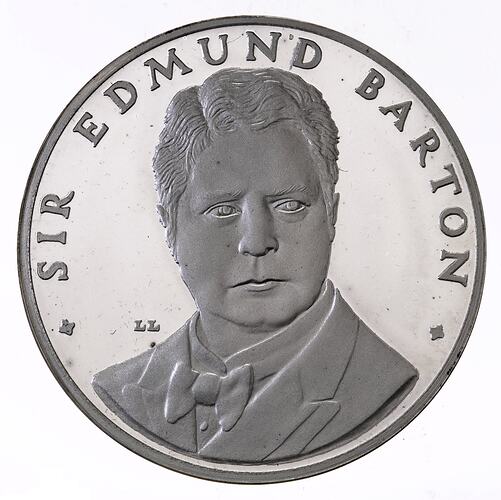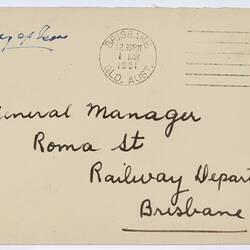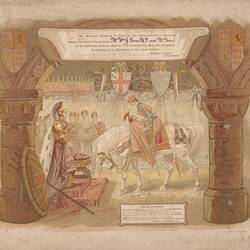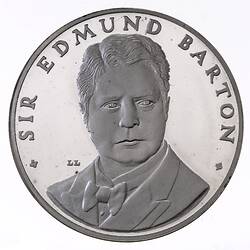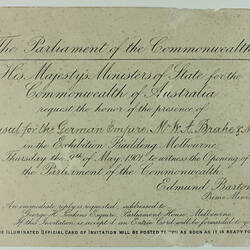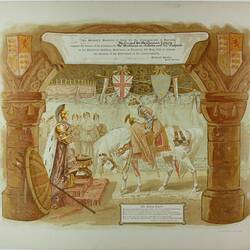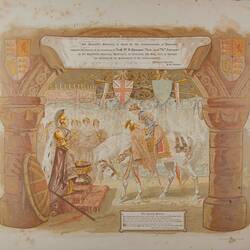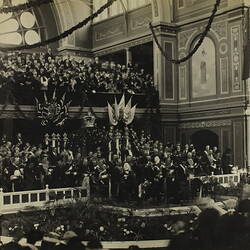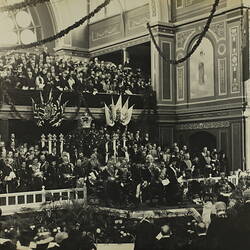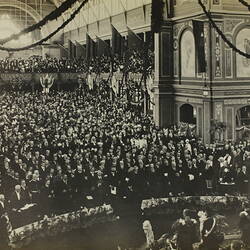Sir Edmund Barton was born in 1849, the youngest son of an English immigrant accountant and a schoolmistress. Barton was educated at Fort Street Model School and Sydney Grammar, where he was school captain in 1864 and 1864. He studied law and classics at the University of Sydney, graduating with an MA in 1870. He learned to debate and began work for a solicitor before he graduated, and in 1871 was admitted to the Bar. By May 1872 he was a junior council. He married Jane (Jean) Mason Ross in 1877, the same year he tried unsuccessfully for the University of Sydney seat in the Legislature. Two years later he won the seat. In 1879 he was elected unopposed to represent Wellington, and in 1882 won the seat of East Sydney.
On 3 January 1883, at the age of 34, Barton became Speaker. The youngest speaker yet, he was given the nickname 'Toby Tosspot' by the Bulletin owing to the club-like atmosphere of his parliaments. He brought the rowdiest members under control through suspensions. He resigned as speaker on 31 January 1887 and was nominated to the Upper House. From January to March 1889 he was attorney-general, and as ex officio leader of the Bar, took silk on 8 March.
Barton was an ardent believer in Australia's destiny as a nation. He was a delegate at the National Australasian Convention, becoming a member of the committee drafting the constitution. He became leader of the Federal movement in New South Wales. On 23 October 1891 Barton became attorney-general, with the right of private practice, in the new Protectionist ministry, which was lukewarm towards Federation. He managed, however, to gain the support of the Premier in Federal resolutions, and these resolutions were carried on 11 January 1893. However, his reputation as a Federation leader had suffered and free traders and Labor members distrusted him. He was defeated for the seat of Randwick in 1894. This allowed him to devote three years to tireless work towards Federation, and by March 1897 was acknowledged as leader of the Federal movement in Australia. He was the first delegate elected to the Australasian Federal Convention in 1897, and was elected leader.
After a long process of drafting and amendments, the Convention ended on 17 March the following year, and Barton was able to focus on a campaign for a referendum to approve the draft constitution. The referendum failed by 8,504 votes, and Barton realised that he was have to make concessions if New South Wales was to accept the constitution. In September 1898 he won a by-election for the seat of Hastings and Macleay, and was immediately elected leader of the opposition. On 29 June the draft constitution was finally passed. Barton resigned as opposition leader in August 1899, unable to form a government when the Premier Reid faltered. He resigned from parliament altogether on 7 February 1900. The following month he and his wife travelled to London as leader of the Australian delegation invited by British Prime Minister Joseph Chamberlain to explain the constitution to the Imperial government.
On his return to Australia Barton was widely expected to be made Australia's first prime minister, but the newly appointed Governor-General, Lord Hopetoun, appointed Sir William Lyne, New South Wales Premier and an unpopular anti-Federationist. It was a disastrous move, which became known as 'the Hopetoun blunder', and when Lyne failed to form a ministry he hastily reneged and appointed Edmund Barton. The Commonwealth of Australia was proclaimed on 1 January 1901, and Barton began his campaign to win the prime ministerial office in his own right. He declared his support for a 'white Australia', gaining him votes from all states except Queensland, with its dependence on 'Kanaka' labour. Elected unopposed for the seat of Hunter, in the same year Barton carried the Immigration Restriction Act and the Pacific Island Labourers' Act, providing for the repatriation of the Kanakas. In December 1901 he acceded to a British request to send soldiers to the Boer War. Barton accepted a knighthood in 1902, and served as Prime Minister until 1903, when he left the Commonwealth Parliament to become a High Court judge.
Barton died suddenly on 7 January 1920, in the Blue Mountains. He was survived by his wife, four sons and two daughters. One of Canberra's first suburbs was named 'Barton' in his honour. He has also been commemorated on stamps and medals.
References:
Australian Dictionary of Biography website http://adbonline.anu.edu.au/adbonline.htm
Commonwealth Government Documenting a Democracy website http://www.foundingdocs.gov.au/text_only/places/cth/cth3ii.htm, accessed 10/10/2003.
More Information
-
Keywords
-
Localities
-
Authors
-
Article types
